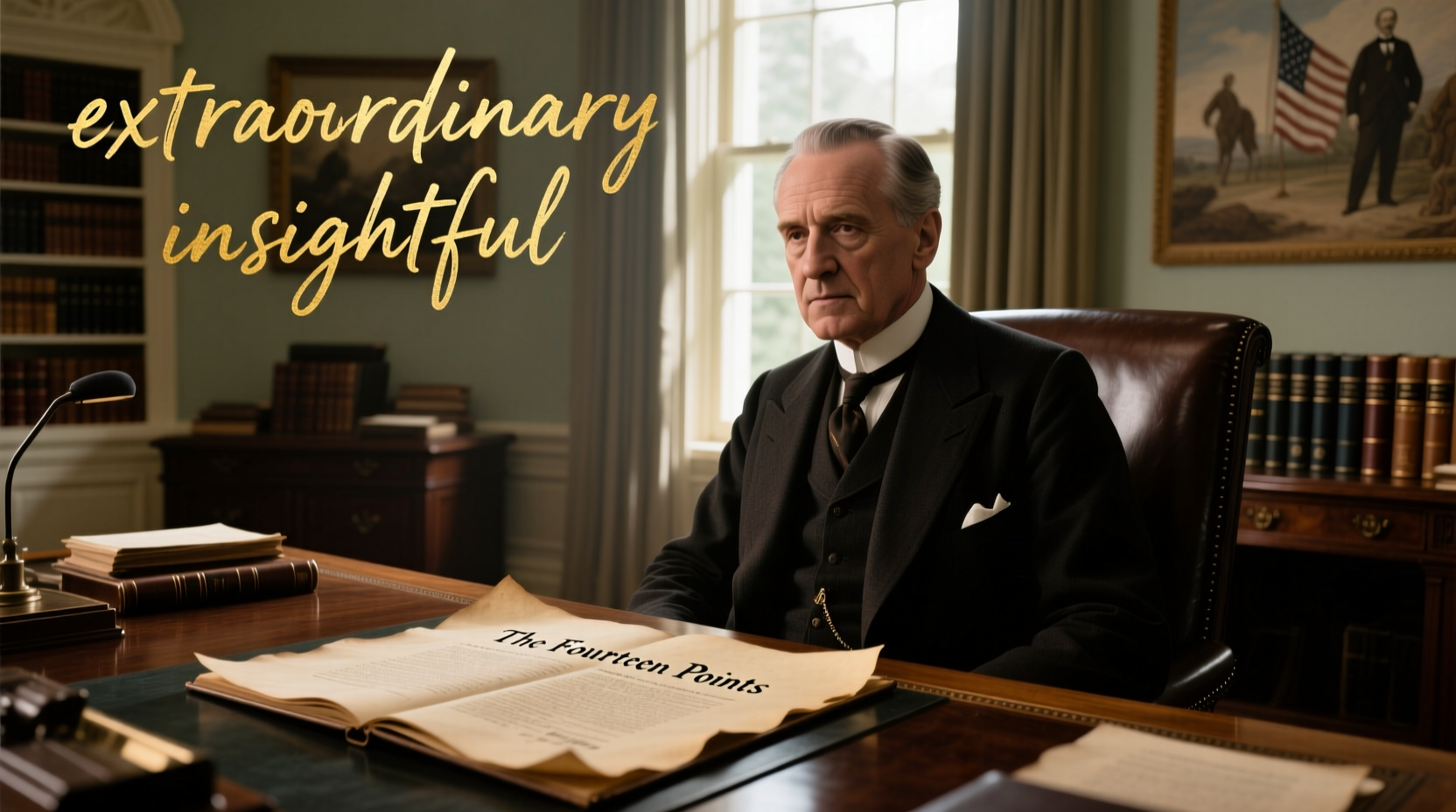In April 1917, President Woodrow Wilson stood before a joint session of Congress to deliver one of the most consequential speeches in American history—the address requesting a declaration of war against Germany. In that moment, he did not merely ask for military action; he framed a moral imperative. Central to that framing was a single, deliberate word: “extraordinary.” His opening line—“It is impossible for me to speak in these days and upon these matters without profound emotion”—led into a justification for action that required more than urgency; it demanded transformation. The choice of “extraordinary” was neither casual nor rhetorical flourish. It was strategic, layered with legal, emotional, and philosophical weight. Understanding why Wilson selected this particular term reveals much about presidential rhetoric, wartime leadership, and the power of language in shaping national consciousness.
The Historical Context of Wilson’s War Address

By early 1917, World War I had raged across Europe for nearly three years. The United States, under Wilson’s leadership, had maintained a stance of neutrality. However, Germany’s resumption of unrestricted submarine warfare—sinking neutral ships, including the Lusitania earlier and now American vessels—combined with the revelation of the Zimmermann Telegram, shifted public and political sentiment. Wilson, committed to peace but increasingly constrained by events, faced the monumental task of justifying a departure from isolationism.
On April 2, 1917, he addressed Congress not as a commander rallying troops, but as a moral philosopher appealing to national conscience. He spoke of “the right,” “peace,” and “justice.” But before laying out his case, he declared the occasion “an extraordinary session.” This wasn’t merely procedural—it signaled that what followed transcended routine governance. An ordinary legislative call could handle budgets or bills. An extraordinary session implied an existential crisis requiring exceptional measures.
Linguistic Precision and Presidential Authority
Wilson, a former academic and president of Princeton University, was acutely aware of language’s power. He didn’t say “urgent,” “critical,” or “important”—all plausible alternatives. Instead, he chose “extraordinary,” a word rooted in Latin *extra ordinem*, meaning “outside the usual order.” This phrase carries both procedural legitimacy and dramatic gravity.
In constitutional terms, an extraordinary session is one called outside the regular legislative calendar, typically reserved for emergencies. By invoking it, Wilson grounded his request in legal tradition while elevating its moral stakes. He wasn’t just calling Congress back—he was redefining the nation’s place in the world.
“Language is not just a tool for communication; it is a mechanism of authority. To call a moment ‘extraordinary’ is to claim the right to act beyond precedent.” — Dr. Rebecca Lang, Presidential Rhetoric Scholar, Columbia University
The Psychological Impact of “Extraordinary”
Psychologically, the word functions as a cognitive marker. It signals discontinuity—a break from normalcy. In times of crisis, leaders use such language to prepare citizens for sacrifice. “Extraordinary” primes the listener for something unprecedented: higher taxes, conscription, societal shifts.
Wilson’s audience—Congress, the press, and the public—needed to understand that entering the war wasn’t a policy adjustment; it was a fundamental reorientation of American purpose. By labeling the session extraordinary, he framed the decision not as a political calculation, but as a historic pivot. This linguistic move helped unify a divided nation, many of whom had opposed intervention.
Why Not Other Words?
Consider alternatives:
- Urgent – implies speed but lacks transformative connotation.
- Critical – suggests danger, but not necessarily a shift in national identity.
- Important – too generic; fails to convey magnitude.
- Exceptional – similar, but less tied to formal procedure.
“Extraordinary” uniquely bridges institutional legitimacy and emotional resonance. It is both a legal term and a rhetorical device.
A Mini Case Study: The April 2, 1917 Speech in Action
Imagine you’re a senator in 1917, skeptical of war. You’ve heard calls for action before, often dismissed as alarmist. Then Wilson begins: “I have deemed it now necessary… to call the Congress into extraordinary session.” Instantly, the tone shifts. This isn’t another debate over trade or tariffs. The president has invoked a rare constitutional power. Your expectations recalibrate.
Minutes later, when Wilson declares, “The world must be made safe for democracy,” the groundwork has already been laid. The word “extraordinary” prepared the audience for a speech that wasn’t just about policy—it was about destiny. Within days, Congress declared war. Public opinion, though still divided, began to coalesce around the idea that America was answering a unique historical calling.
This case illustrates how a single word, placed at the beginning of a pivotal moment, can shape perception, justify action, and mobilize a nation.
Step-by-Step: How Wilson Built the Case Using Language
- Declared the session extraordinary – establishing procedural and moral gravity.
- Appealed to principle over interest – framing war as a defense of global democracy, not retaliation.
- Used passive voice strategically – e.g., “The wrongs done to us” instead of naming Germany as an aggressor, preserving diplomatic nuance.
- Elevated the nation’s role – positioning the U.S. as arbiter of justice, not just a belligerent.
- Concluded with a call to service – asking not for vengeance, but for a lasting peace.
This sequence shows how “extraordinary” functioned as the first domino in a carefully constructed argument.
Do’s and Don’ts of Presidential Wartime Rhetoric
| Do’s | Don’ts |
|---|---|
| Use precise, constitutionally grounded terms (e.g., “extraordinary session”) | Resort to inflammatory or emotional language without justification |
| Frame conflict as a moral necessity, not personal vendetta | Overpromise outcomes or downplay costs |
| Align language with institutional authority | Act unilaterally without congressional or public buy-in |
| Prepare the public for long-term sacrifice | Use vague or euphemistic terms to obscure reality |
Frequently Asked Questions
Did Wilson have the authority to call an extraordinary session?
Yes. Under Article II, Section 3 of the U.S. Constitution, the president may convene both houses of Congress “on extraordinary Occasions.” Wilson exercised this rarely used power deliberately to underscore the gravity of the moment.
Was the word “extraordinary” commonly used in presidential addresses before Wilson?
Rarely. While the term existed in legal and parliamentary contexts, Wilson was among the first to deploy it so prominently at the outset of a major policy shift. Its use since—such as during the 9/11 address or financial crises—reflects his influence on modern presidential rhetoric.
Could Wilson have achieved the same effect with different wording?
Possibly, but not as effectively. Alternatives might have conveyed urgency, but only “extraordinary” carried the dual weight of constitutional formality and transformative implication. It signaled that the nation was entering uncharted territory—not just politically, but ethically.
Expert Insight: The Legacy of Wilson’s Word Choice
“Wilson’s use of ‘extraordinary’ set a precedent for how presidents invoke emergency authority through language. It’s not enough to act; they must first redefine the moment. That rhetorical threshold remains essential in democratic societies.” — Dr. Marcus Holloway, Historian, Brookings Institution
This insight underscores that presidential communication isn’t just about information—it’s about legitimacy. Words like “extraordinary” serve as gateways to action, giving leaders the rhetorical space to ask citizens for difficult sacrifices.
Conclusion: The Power of One Word
President Wilson’s choice of “extraordinary” was far more than stylistic preference. It was a calculated fusion of constitutional protocol, moral appeal, and psychological preparation. In a single term, he transformed a war resolution from a political decision into a historic mission. Today, as leaders face global challenges—from pandemics to climate change—the lesson endures: language shapes reality. Precision, context, and intention matter deeply.
Understanding why Wilson chose “extraordinary” offers more than historical insight—it provides a model for how words can summon nations to their highest purposes. In moments of crisis, the right word, spoken at the right time, can alter the course of history.









 浙公网安备
33010002000092号
浙公网安备
33010002000092号 浙B2-20120091-4
浙B2-20120091-4
Comments
No comments yet. Why don't you start the discussion?